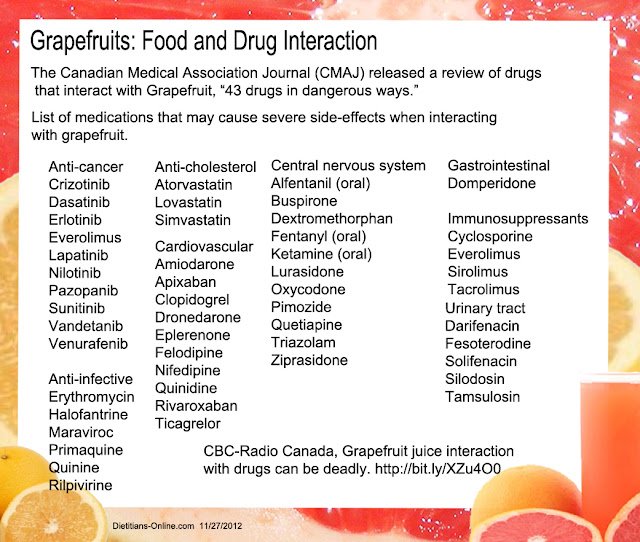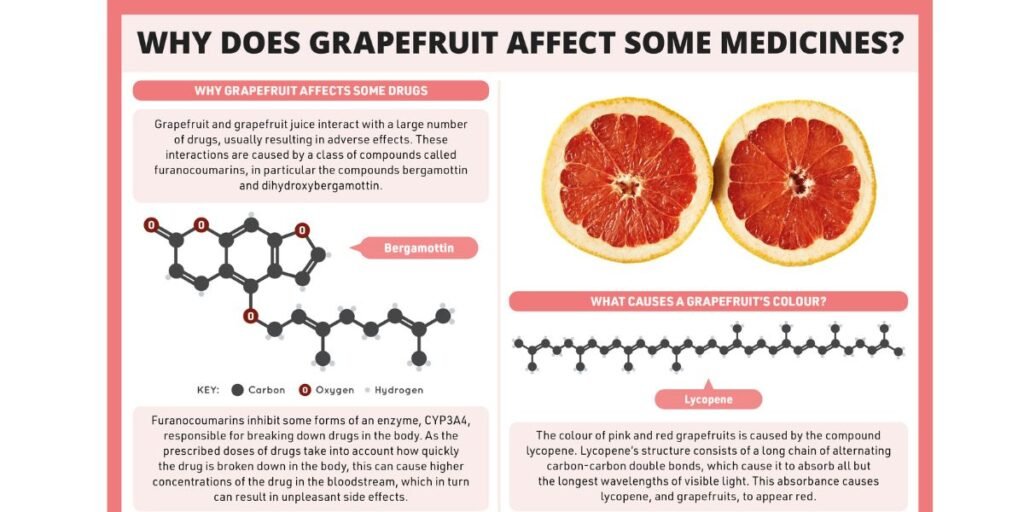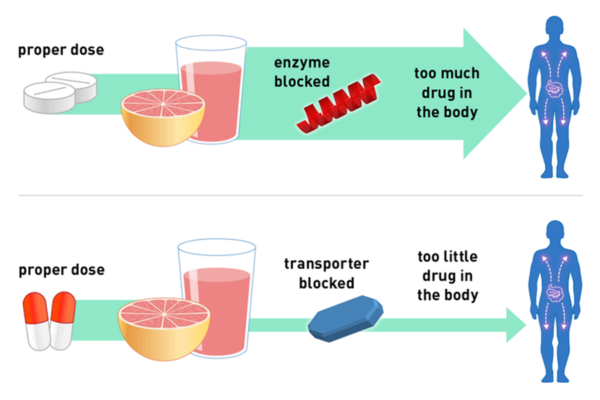Grapefruit and grapefruit juice can interact with various medications, leading to potentially serious health risks. This interaction occurs because compounds in grapefruit affect enzymes responsible for drug metabolism, altering their potency. Understanding these interactions is crucial to avoid unintended side effects and ensure medications work as intended.

How Grapefruit Affects Medications
Grapefruit contains compounds that inhibit the CYP3A4 enzyme in the liver and intestines. This enzyme plays a crucial role in drug metabolism. When grapefruit blocks this enzyme, more of the drug enters the bloodstream, increasing the risk of side effects or toxicity. Conversely, some medications may become less effective because grapefruit reduces their absorption.
Medications That Interact with Grapefruit

1. Blood Pressure Medications

Grapefruit can dangerously increase drug levels in the blood, leading to low blood pressure, dizziness, or heart problems.
- Calcium Channel Blockers (used for high blood pressure & heart conditions):
- Amlodipine
- Felodipine
- Nifedipine
- Verapamil
- Diltiazem
2. Cholesterol-Lowering Drugs (Statins)

Statins help lower cholesterol, but grapefruit can increase drug levels, raising the risk of muscle damage (myopathy) and liver damage.
- Common Statins Affected:
- Atorvastatin (Lipitor)
- Simvastatin (Zocor)
- Lovastatin (Mevacor)
3. Immunosuppressants (for organ transplant patients)
Grapefruit can lead to excessive drug levels, increasing toxicity risks.
- Drugs Affected:
- Cyclosporine
- Tacrolimus
- Sirolimus
4. Anti-Anxiety and Mental Health Medications
Grapefruit can make these drugs more potent, causing excessive drowsiness or mood changes.
- Drugs Affected:
- Buspirone
- Diazepam (Valium)
- Sertraline (Zoloft)
- Quetiapine (Seroquel)
5. Pain Relievers
Certain pain medications can build up to dangerous levels when taken with grapefruit juice, increasing sedation and respiratory depression risks.
- Drugs Affected:
- Oxycodone (OxyContin)
- Fentanyl
- Methadone
6. Erectile Dysfunction Drugs
Grapefruit increases the risk of low blood pressure, dizziness, and fainting.
- Drugs Affected:
- Sildenafil (Viagra)
- Tadalafil (Cialis)
- Vardenafil (Levitra)
7. Anticoagulants (Blood Thinners)
Grapefruit can either increase or decrease drug effectiveness, affecting blood clotting.
- Drugs Affected:
- Warfarin (Coumadin)
- Rivaroxaban (Xarelto)
- Apixaban (Eliquis)
8. Allergy and Antihistamine Medications
Grapefruit can reduce drug absorption, making them less effective.
- Drugs Affected:
- Fexofenadine (Allegra)
Medications That Interact Badly with Grapefruit Juice

The following categories of medications are particularly dangerous when taken with grapefruit juice:
- Heart Medications: Can cause arrhythmias or dangerously low blood pressure.
- Statins: Can cause muscle breakdown and kidney damage.
- Mental Health Medications: Can cause excessive drowsiness and confusion.
- Pain Relievers: Can increase sedation and risk of overdose.
If you are prescribed any of these medications, consult your doctor or pharmacist before consuming grapefruit juice.
Medications That Interact with Grapefruit Seed Extract
Grapefruit seed extract, often used as a natural remedy, may interact with medications in similar ways as grapefruit juice. Be cautious when using it alongside:
- Blood pressure medications
- Statins
- Immunosuppressants
- Mental health drugs
- Pain relievers
Always check with a healthcare professional before using grapefruit seed extract if you are on any prescribed medication.
Final Thoughts
Grapefruit and grapefruit juice can significantly impact the way certain medications work, sometimes leading to severe side effects or reduced drug effectiveness. Understanding these interactions is crucial for anyone taking prescription drugs, especially for heart conditions, cholesterol, mental health, and pain management.
If you take any of the medications listed in this article, it’s best to consult with your healthcare provider before consuming grapefruit or its extracts. Being informed and cautious can help you avoid unwanted health risks and ensure your medications work as intended.
FAQs About Grapefruit and Medication Interactions
1. How much grapefruit is safe to consume while on medication?
Even small amounts can cause interactions. Some drugs are affected by as little as one glass of juice.
2. How long after taking medication can I drink grapefruit juice?
It depends on the drug, but the effects of grapefruit juice can last up to 24 hours. It’s best to avoid it completely unless advised otherwise by a doctor.
3. Are all citrus fruits unsafe with medications?
No. Only grapefruit, Seville oranges, pomelos, and tangelos contain the compounds that affect drug metabolism.
4. Can cooking grapefruit reduce its interaction risk?
No. The interaction is caused by chemical compounds that remain active even after cooking.